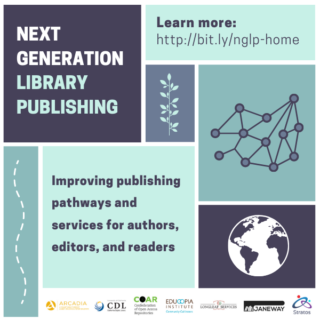
December 9, 2021
Collective Stewardship of Open Infrastructure for Library Publishing: A Framework for Cooperation
By Sarah LippincottThe Next Generation Library Publishing project (NGLP) is committed to empowering library publishers through a combination of technical solutions and values-driven infrastructure. We believe that new software alone can’t create large-scale and lasting change. In order to make our open source software (OSS) accessible to libraries at all scales, and to ensure it aligns over the long term with academic values, we also need values-based approaches to stewardship and deployment. To this end, NGLP has convened a working group that assembles software developers, potential service providers, and library publishing advocates to strategize collaborative maintenance of NGLP’s software components and build sustainable services around them.
The working group’s conversations have engaged a familiar question for many communities working towards transformative change: how do we balance idealism and pragmatism? Our project aims to produce effective, feature-rich software that works for a diverse range of library publishers and to make it available at a competitive price. We also want our components to represent the leading edge of interoperability, openness, and ethical business practices. The success of our endeavor depends on presenting a compelling and competitive case for values-aligned models to potential customers and potential service providers.
The NGLP team has encountered resounding enthusiasm for such models in our extensive conversations with library publishers. During our initial community engagement at the outset of our project, library publishers “indicated that they would prefer to shift to a hosted solution if an option met both their technical needs and their business model requirements, particularly those concerning community governance and control”. This attitude reflects our community’s disenchantment with existing commercial repository and publishing solutions, as well as broader societal trends towards values-based consumerism.
In conjunction with our software development, NGLP is therefore working to cultivate a network of service providers who want to build fair, collaborative, and profitable/sustainable partnerships with library publishers. NGLP’s Values and Principles Framework (slated for a published revision in early 2022), which evaluates service providers against concrete and detailed metrics and collects substantiating evidence, provides a mechanism for encouraging genuine values-alignment and accountability to the community.
However, adherence to many of the principles outlined in the framework requires significant investment of time and money. At worst, this could exclude promising but under-resourced groups from participating in our community. And, in all likelihood, it puts our community at a disadvantage relative to those who deliberately opt out of values-aligned models. For example, can a service provider who invests resources into simplifying content migration (through their technical solutions, contract terms, and customer support apparatus) realistically compete with one whose business model depends on and benefits from customer lock-in?
We have the potential to reduce this risk, and augment our impact, if we commit as a community. Collective action, a coordinated approach to transformative change that is receiving increasing attention in the scholarly communications sector, emphasizes the importance of incentivizing alignment and commitment at the system level, not at the level of any one organization or individual. When software communities develop in isolation, they risk working at cross-purposes, duplicating efforts, or having important work fall through the cracks. When they deliberately collaborate with complementary initiatives, communities “with different tasks, roles, sets of expertise coordinate their work,” creating opportunities for economies of scale, specialization, and mutual benefit. Convening stakeholders is NGLP’s first step in encouraging horizontal alignment within our community.
What comes next? Building the mechanisms that will integrate this network over time. Our working group will be exploring a number of paths forward.
- Revenue-sharing models. NGLP’s software components, and the business models of our service provider network rely on the work of existing OSS communities such as DSpace, Janeway, PKP, and others. We believe that service providers hosting turnkey solutions that use components produced by NGLP and others should commit to a virtuous cycle of maintenance by contributing back a portion of revenues to all of the OSS that makes up their stack.
- Evaluation requirements. We believe that service providers in our network should be regularly evaluated against the NGLP Values and Principles Framework and meet minimum expectations for adherence and/or progress towards alignment goals.
- Trusted provider registry. NGLP wants to promote values-aligned services and offer peace of mind for customers through a trusted provider registry that builds confidence in long-term sustainability and values-alignment, encourages coordination amongst providers, and offers a mechanism for concrete accountability to the library publishing community.
As we prepare to launch three pilot implementations of the NGLP stack with three values-aligned service providers, our working group will be confronting the core question: are we at a moment when there is enough momentum to make the leap into putting values-alignment at the heart of procurement decisions in libraries?